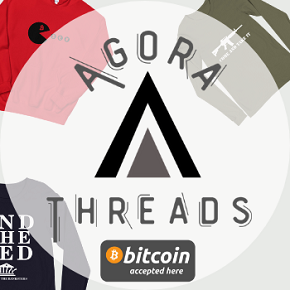
The Properties Of Money And Cryptocurrency
“It is well enough that people of the nation do not understand our banking and monetary system, for if they did, I believe there would be a revolution before tomorrow morning.” -Henry Ford
Money in general is an important part of agorism. We use it to trade with one another voluntarily in a free market. It can also be a great tool to evade extortion and save some of our precious wealth while rewarding other agorists who provide value in the marketplace. It is a great way to choose the change you want to see in the world. Money is essentially just a way to store economic energy.
When I talk of money people assume I mean some form of fiat currency — this is false. Fiat is a currency but it is not money. Currency and money are two different things. Unfortunately, if you went to public school like me they did not teach you about this critical element of human society, money. If government schools taught people about money the masses would realize they were being stolen from, not only through taxation alone.
The theft I speak of and Henry Ford was referring to in his quote, was that of the Federal Reserve. I’m going to explain this as simply as possible. For the government to pay for its deficits (irresponsible spending) the treasury issues bonds. Bonds are IOUs that can be spent today and paid back in full plus interest, to bond holders later. This IOU will be placed on the back of “taxpayers” to bear the burden later on. Banks show up to a bond auction and the biggest bidder of this bond wins and is incentivized to do so by earning interest on the bond. Banks then swap IOUs and sell the bonds to the federal reserve. The Federal reserve buys those bonds with currency that is essentially just printed out of thin air. All throughout this process nothing of real value has been created, only taxpayer “paid” IOU swapping and an increase in the money supply without backing.
History is critical to understanding how and why things become money or currencies. Across the millennia, money has had certain essential qualities. The Romans used salt to supplement soldiers. Historians believe this is where the word salary originated from, as well as the word soldier — ‘sal dare’ meaning literally ‘to give salt.’ What follows are some reasons salt and other such materials and objects were used, and what made them good mediums of exchange. Money has to have seven qualities: medium of exchange, unit of account, fungibility, easily divisible, portable, durable and a store of value. Further, we’ll examine what other media of exchange embody these traits today.
The 7 properties of money.
1. Medium of exchange
A medium of exchange is an intermediary instrument or system used to facilitate the sale, purchase, or trade of goods between parties. Every major medium of exchange found throughout history has had a use case, however small or religious. This is the most important property of money.
Cacao beans were a medium of exchange because they had many use cases. The Aztecs used cocoa butter to protect skin against the sun and cacao had some religious significance. Cocoa also made a bitter chocolate-y drink they would consume as well as other drinks. Cowrie shells were also a medium of exchange in China, India, parts of Africa and many other places in the world. Cowrie shells were used as jewelry much like gold and silver in early days.
Even on the Micronesian island of Yap, huge, rare, heavy limestones were used as gifts, dowries, and represented standing and reputation amongst the tribe and on the island. Some stones were engraved to record battles from more than 200 years ago. In Cameroon along with cash, beer bottle caps are used for small goods and services because beer companies offer prizes underneath the caps so they’re used to redeem prizes. Salt was a medium of exchange in Rome. The Romans had many use cases for salt. They used it to store meat since they didn’t have refrigeration. It was also used for cooking and to clean open wounds. The sodium in salt is also something our bodies need and use.
2. Unit of account
A unit of account is a standard monetary unit of measurement. A unit of account is something that can be used to value goods and services, record debts, and make calculations. In other words, a measurement of value. For example: “this cost five dollars,” or “you owe me five dollars.” Unfortunately no cryptocurrency is a unit of account yet, because we don’t ask how much Ethereum is that? I suspect when cryptocurrency achieves mass adoption and the price stabilizes, that some of them will be a units of account.
3. Fungibility
For something to be fungible it must be interchangeable and each unit indistinguishable from another. Ancient Greece was the first recorded civilization to mint gold coins that were of identical dimensions, creating the first true money in history.
Put simply, you and I could swap a gold coin with each other and still have the same amount that we did previously. This was until they started to add copper and other base metals. This is where you see Gresham’s law come into play: “bad money drives out good.” So if we have a silver dollar and a regular paper dollar and the market says we can use both as a dollar, naturally most people will spend the paper dollar and keep the silver dollar, which in turn keeps bad money in circulation and drives out the good. For the most part, gold and silver coins along with salt have been fungible. This is a property crypto can only have if it’s private. Previous coins being reflagged and turned away because they were in a black market exchange removes this property of money. This means that the coin being flagged is not the same as the one that is not. therefore not fungible.
4. Easily divisible
Gold and silver that were, and remain, fungible are easily divisible and can be exchanged for lesser amounts. In other words, you could easily make smaller amounts of change. Salt is easily divisible and could be measured down to a single grain or up to multiple Roman libras (AKA pounds).
5. Easily transferable and portable
Transferability is essential in trade; being able to move large amounts of value quickly and over large distances made trade easier and more efficient. Salt can be transferred in bags, is easy to store and has no expiration date. Gold made it easy for large amounts of wealth to be transferred in smaller amounts.
6. Durability
Durability is a quality that all money has to have. It has to be able to withstand the elements and to withstand any possible damage in transport. It also cannot disappear with use. Salt in mineral form is pretty durable. This is where Gold and silver have withstood the test of time. Still to this day we have gold coins as old as 2,200 years.
7. Store of value
SOV is the function of an asset that can be saved, and retains or gains purchasing power later on. SOV is the main difference between whether something is money, or just a currency. This is exactly why the U.S. dollar is no longer money — because it’s no longer backed by gold, which change President Nixion effected in 1971. The U.S. dollar along with every other fiat currency constantly inflates via printing, losing purchasing power. However, a store of value is not a primary use case of money alone, value is only stored because the money is primarily useful in some other way. People do not store that which is not useful.
Roger Ver states: “There is no such thing as store of value use-case alone.“ This couldn’t be any truer. If fiat currency wasn’t easily transferable, there’s no way it would be used just to ‘store value.’
The BTC version of bitcoin sacrificed an easy fix (increasing block size), to a second layer “solution” called lighting network that has been an unpredictable science experiment almost no better than regular financial institutions, and left a model they knew worked, (increasable block size) changing the entire core value proposition, which in many senses is now lost. Losing its ability to be easily transferable due to network congestion and high fees, adopters understandably defected. Adopters like newegg, the Steam gaming platform and many others. BTC, not being as easily transferable and often unpredictable in bull markets in terms of fees and transfer times, has lost traction as a medium of exchange.
The case for cryptocurrency as money
What makes cryptocurrency money? It’s durable, because it can’t be destroyed. Anyone could lose their private keys but they could also lose fiat by dropping their wallet on the ground. Crypto is fungible because having one monero is exactly the same as another person having one. Fungibility is where cryptocurrency takes the cake, because every unit is exactly the same and verified by multiple miners in minutes. With gold and silver it is more difficult to verify purity instantly. And also, cryptos are easily divisible going from 1 to 0.000001. Easily transferable in that anyone could transfer some to the other side of the earth in an instant. Transferring five cents worth of crypto in an instant for 1/10th of a penny is also a use case. You can’t do this with any financial institution currently. The minimum transfer amount for most banks is around $25, and the fee is a couple dollars. Which takes around 1-2 business days.
With crypto anyone can send millions from Canada to China very quickly. With no other form of value can I do this. Furthermore, it is very easy to move across imaginary lines, AKA “borders.” Many countries’ items have to be declared thanks to an import tax — usually 25% of the value of the merchandise being imported.
Crypto also has many other use cases in that I no longer need a third party to hold my money. Every drug dealer knows that cutting out the middleman is always cheaper. Since you are your own bank, no government agency can freeze or confiscate your funds. If the banks go under and decide to take your funds with them, you are out of luck. With crypto you have complete control. Only time will tell which cryptos will win out. As Agorists we should use other forms of value to take away the monopolistic power of the central banks, evade extortion, and realize many crypto’s have the properties of real money.
Every fiat currency is ultimately doomed
Fiat currency is legal tender whose value is backed by the government that issued it. Every Fiat currency in history has failed; every fiat currency around the world today has an unlimited supply, and is forever running through the printing presses. This will eventually catch up with the world and we’ll see huge hyperinflation amounts that could easily dwarf Zimbabwe and Venezuela. So, having a crypto with a limited supply and/or a small, limited coded inflation rate as miner rewards means you’ll be protected from hyperinflation. This is the main reason why the U.S. and most of the world will have the worst depression in history, coming soon.
Privacy
In the world we live in today privacy is extremely important. Especially since governments all over are becoming ever more tyrannical. They will become more socialistic to gain more power and increase the tax on their inhabitants. Granting ‘services’ to their good slaves and taking away ‘services’ from those who will not obey.
Coronavirus is just the scapegoat for decades of devastating economic policy. The state is collapsing the economy and the currency, making everyone dependent on them so they can usher in a new social credit system. This will allow governments to create a new digital dollar crypto they’ve been salivating to create. With a digital dollar the state can create more at will, easily distribute it among UBI and welfare recipients, track and trace every transaction, and impose unavoidable fees, penalties, and policies, including restricting usage for the disobedient. This will make dodging extortion almost impossible. That said, many privacy cryptos give you freedom away from the gluttonous eyes of the impoverishing extortionist state.
“What has been wrongly gained is wrongly lost.” –Cicero.
For more on my information on privacy cryptocurrencies see this article Agorism and breaking the chains of the state.
The Evolution of money
In my opinion transparency will be a key factor of money in the future. Knowing the exact amount in circulation and having large amounts verified by multiple miners in minutes. The never ending imaginable use cases of cryptocurrency, instant transferability and ultimate transparency could possibly make precious metals somewhat obsolete.The transferability I could see on seasteads, as well as multiplanetary collaborations, institutes, and trade.
Going digital
Everything is going digital. Socializing, games, media, even ordering pizza and other products. Many fiat currencies are pretty much digital already, and governments backing them with violence strive to implement them with blockchains. So crypto’s being digital doesn’t delegitimize it from being money. Cryptocurrency is just the next phase in money.
Conclusion
All of the qualities listed above, some cryptos have today, and a handful will be defined as money for the world. I myself am looking for ones with the most use cases as well as the qualities of being easily divisible, easily transferable, private and limited in supply.
Today we can use value to avoid the government, like in many ways the market does already toward businesses that rip off customers or treat them badly. Those businesses eventually go out of business.
Think of it like a McDonald’s where the managers don’t care about your order that they’re constantly getting wrong. Many times the burger does not have meat on it, but you have to pay them while they hold a gun to your head, whether you take the service or not, and many times people don’t because ordering is a hassle that takes five hours and tons of paperwork. Your privacy is annihilated because to get your burger they have to make sure your income qualifies, and the employees are impertinent and violent, without repercussions.
I think many people would decide not to fund a service like this even under threat but the magical word ‘government’ is used and the programmed brainwashing activates. I believe we can all live in a more peaceful prosperous world without funding violent extortionists, and if we use real money we will be taking away their main power structure and putting them out of business.
Not financial advice.









